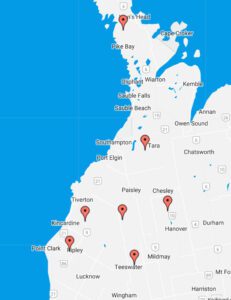A spotlight on a pilot project development in Ontario.
Ag plastics are important tools that help farmers store feed for their livestock, bring crop inputs to their farm, and control moisture.
Cleanfarms’ Building a Zero-Plastic Waste Strategy for Agriculture is a multi-year project aimed at increasing agricultural plastics’ (ag plastics) recycling capacity, and is now entering the second year of pilot operations.
Getting started in Bruce County
Bruce County is working on expanding the options available to farmers who want to uphold good land stewardship practices in the province.
At the outset of this pilot project, farmers were provided with plastic collection bags to sort, store, and transport their silage film and bale wrap to collection sites, and they brought in over 40 tonnes of material to date.
This demonstrates the strong enthusiasm of farmers in Bruce County and quickly allowed us to evaluate the usefulness of collection bags as a way to ensure that ag plastics are stored in a manner in which they can be recycled efficiently.
Here are some of the key learnings:
- While offering collection bags allowed the pilot to get started quickly in the area, the bags can be cumbersome to incorporate into farm routines, especially for larger operations with daily practices of plastics removal.
- The volume of material that comes into collection depots requires a significant amount of space for storage, specialty equipment for pickup and transportation and significant coordination.
Introducing on-farm compactors

In Bruce County, Cleanfarms first worked with two farmers to get an initial assessment of compactors as an alternative to collection bags.
Following positive feedback, the focus turned towards identifying other large-volume users willing to try out this new tool.
Fifteen on-farm compactors are now in use in the region, with an additional twenty coming into play over the next year.
Ideal testers
Pilots are aimed at bringing the right tools and the right people together.
By nature, farmers are innovators and it makes them ideal candidates for these types of projects.
They have to communicate how we need to shift perspectives so that used ag plastics can be seen as a resource and not just trash to get rid of.
Pilot projects provide hands on experience, demonstrate proof of concept, determine what collection and processing options are currently available and help explore end markets.
Upcoming
Fall 2023/Winter 2024 – This phase of the grower survey will provide important measurements that will determine how access to recycling programs has improved and farmer uptake.
Winter 2024 – The next round of consensus building will bring stakeholders back together to evaluate long term options and the project’s success.
More Information
Read more at cleanfarms.ca
